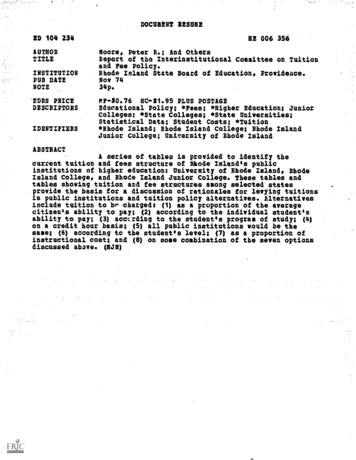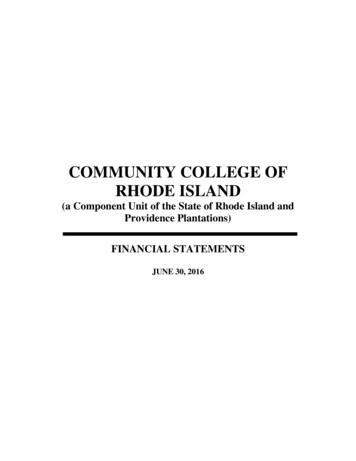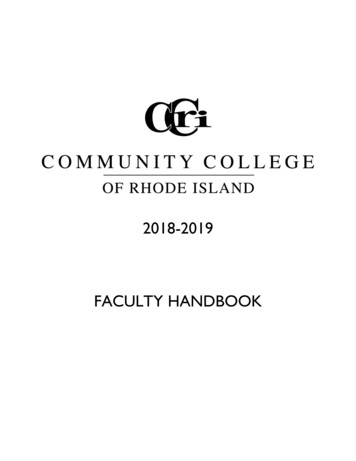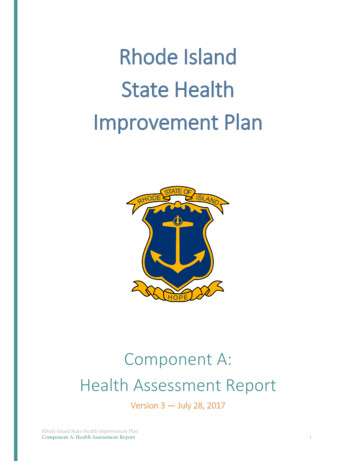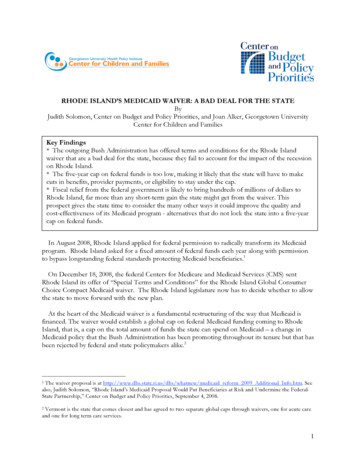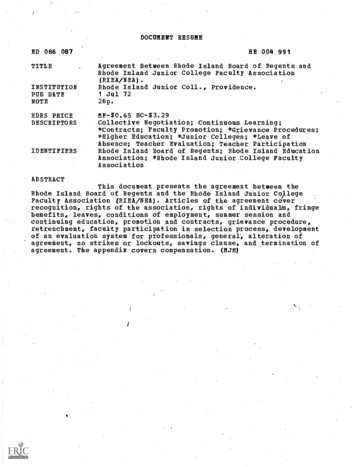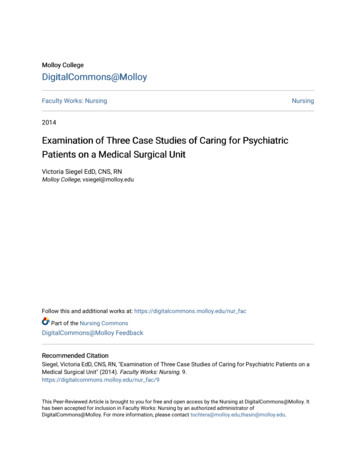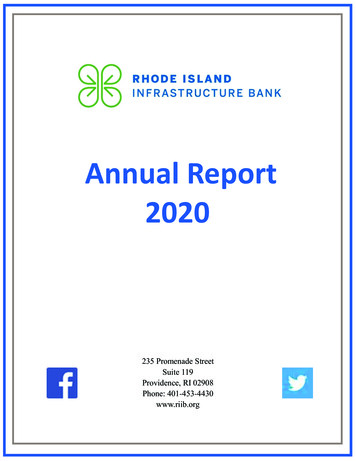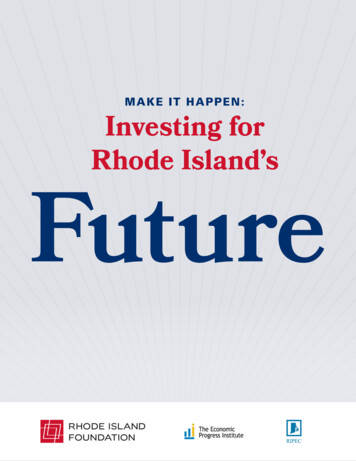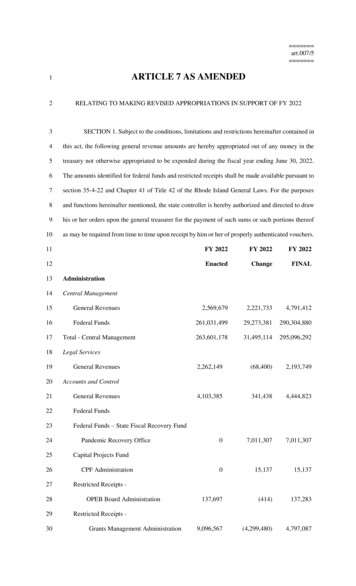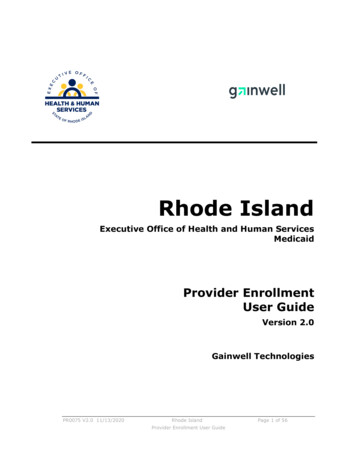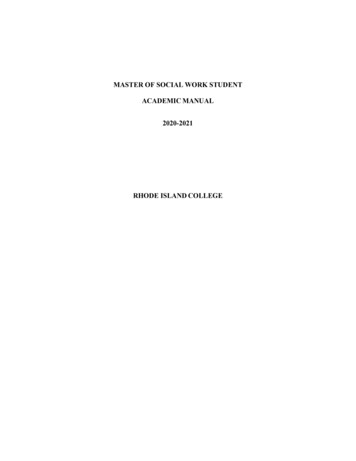
Transcription
University of Rhode IslandDigitalCommons@URIURI Course CatalogsUniversity Archives1974URI Undergraduate Course Catalog 1974-1975University of Rhode IslandFollow this and additional works at: mmended CitationUniversity of Rhode Island, "URI Undergraduate Course Catalog 1974-1975" (1974). URI Course Catalogs.Book is Book is brought to you for free and open access by the University Archives at DigitalCommons@URI. It hasbeen accepted for inclusion in URI Course Catalogs by an authorized administrator of DigitalCommons@URI. Formore information, please contact digitalcommons@etal.uri.edu.
he UniversityUniversity Programs and RequirementsAdmission and RegistrationExpenses and Student AidStudent Life and ServicesUniversity CollegeCollege of Arts and SciencesCollege of Business AdministrationCollege of EngineeringCollege of Home EconomicsCollege of NursingCollege of PharmacyCollege of Resource DevelopmentCourses of InstructionDirectoriesAppendixCampus MapIndexVolume LXX, Number 3, September 1974Bulletin of the University of Rhode Island . Publishedquarterly by the University of Rhode Island, Kingston,Rhode Island 02881. Second-class postage paid at Wakefield, Rhode Island 02880.
The University of Rhode Island is a coeducationalstate-assisted institution founded in 1892 as one ofthe land-grant colleges. In 1971 it became one ofthe first four sea grant colleges in the country. TheUniversit y is located in the village of Kingston, inhistoric "South County ," 30 miles south of Providence and six miles from the ocean.The function of a university is the discovery anddissemination of truth . The University of RhodeIsland carries out this function through its activitiesin the three major areas of instruction, research, andextension. To enable it to do so most effectively, theUniversity has given support to the principle offreedom in inquiry and expression for both facultyand students, pointing out, however, that suchacademic freedom carries with it duties correlativewith rights. The University holds that the commongood depends upon the free search for truth and itsfree exposition.Consistent with the University 's land-grant tradition , preparation for a life's work and for intelligent and responsible citizenship are major goals ofinstruction .All programs aim at a balance of studies in thenatural and social sciences, the humanities, andprofessional subjects .Undergradu ate students may earn a Bachelor ofScience degree in any one of the seven degreegranting colleges of the University. Study in theCollege of Arts and Sciences may also lead to thedegree of Bachelor of Arts, Bachelor of Fine Arts,or Bachelor of Music. In the two-year programs indental hygiene and commercial fisheries, the degreeof Associate in Science is conferred.Study at the graduate level leads to the master'sdegree in 65 areas of study and the degree ofDoctor of Philosophy in 24.
4THEUNIVERSITYtration, Operations Management, OrganizationalManagement and Industrial Relations.COLLEGE OF ENGINEERINGChemical Engineering, Chemical and OceanEngineering, Civil and Environmental Engineering,Electrical Engineering, Engineering Science,Industrial Engineering , Mechanical Engineering andApplied Mechanics, Mechanical and Ocean Engineering .COLLEGE OF HOME ECONOMICSGeneral Home Economics; Child Developmentand Family Relations; Food and Nutritional Science,and Food Services ; Home Economics Education;Textiles , Clothing and Related Art.COLLEGE OF NURSINGCOLLEGE OF PHARMACYPharmac y (five years), Respiratory Therapy.COLLEGE OF RESOURCE DEVELOPMENTAgricultural and Resource Technology, AnimalScience , Commercial Fisheries ( two years), NaturalResources , Plant Science.INTERDEPARTMENTALBlack Studies, Food Science and Technology,Urban Affairs.GRADUATESTUDYGraduate study is offered leading to the degreesof Master of Arts, Master of Science, Doctor ofPhilosophy, and the master's degree in severalprofessional fields. Within each college's chapter inthis bulletin, the related graduate degrees are listed.The Graduate Library School which offers studyleading to the Master of Library Science degree islocated on the Kingston campus. Students inundergraduate and other graduate programs may,with the approval of their advisers, enroll in suchlibrary science courses as relate to their studies.The Graduate School of Oceanography is locatedon the Narragansett Bay Campus of the Universityand offers study leading to the Master of Scienceand Doctor of Philosophy degrees. Instruction islimited to graduate study with the exception of onesurvey course at the 400-level.A student holding the baccalaureate degree fromthis institution or from another having equivalentrequirements may be admitted for graduate studyproviding that his credentials meet the standards setby the Graduate School and by the department inwhich he wishes to study, and that facilities forstudy are available in his field of interest. Among
RESEARCHthe standards required for full status admission arean undergraduate average approximating B or betterand satisfactory scores on a nationally administeredexamination. Applicants with somewhat lowerundergraduate averages but high examination scoresmay be admitted on conditional status. Individualdepartment s may, however , apply admission standards which are higher than the general standardsjust described.Application forms and a copy of the GraduateSchool Bulletin, which contains the detailedrequirements and descriptions of advanced degreeprograms , are available from the Dean of theGraduate School, University of Rhode Island,Kingston, Rhode Island 02881. The zip code mustbe included in the applicant's return address. If,after studying the bulletin, the applicant has specificquestions concerning particular degree programsor courses of instruction, these should be addressedto the chairman of the appropriate department.Applications must be returned to the Dean of theGraduate School.Each applicant must submit ( 1) completedapplication forms in duplicate, with a 12 nonrefundable application fee ( check or money orderpayable to the University of Rhode Island); (2)three letters of recommendation from individualsfamiliar with the applicant's work, preferably in thefield for which he is applying; (3) two copies of anofficial transcript sent directly from each collegeor university attended; and ( 4) scores from theGraduate Record Examination aptitude tests (seethe Graduate School Bulletin for those departmentswhich require the advanced tests) .Applicants from foreign countries must completethe Test of English as a Foreign Language(TOEFL) with minimum scores of 500 for sciencestudents and 550 for non-science students. Allinquiries from international student s concerningapplications, fees, housing, etc., should be directedto the Director for International Student Affairs, 4Taft Hall.The usual deadlines for receipt of applicationsare April 15 for September and Summer Sessionadmission, and November 15 for February admission.SUMMERAND EXTENSION51instructors and individual course fees. Summerregistrations are accepted on a first-come basis inthe Summer Session Office, Green Hall , until twoweeks h,efore the first day of classes in each session.University of Rhode Island students planning to usesumme t credits to satisfy degree requirements shouldhave their program approved by their academicdeans efore registering.ADULTEoucA TIONThe Division of University Extension providesadult residents of Rhode Island with an opportunityto enh nce their liberal and professional education.Credit courses are offered in the sciences and the /humanities, engineering, business, and home economics. I Academic programs lead to the degrees ofBachelor of Science in Accounting and GeneralBusiness Administration, Bachelor of Arts in English, Master of Business Administration, Master ofArts in English, Master of Public Administration ,and Master of Science in Accounting. A continuingeducation program in the morning leads to theBachelor of Arts in English, History, Psychology orSecondary Education , or the Bachelor of Science inHome Economics Education or Child Developmentand Family Relations . The division operates certification programs for various professions as well asindividual credit and non-credit courses. Institutes ,seminars, conferences, and short courses are plannedfor business , industry, labor, government , and theprofessions. A counseling service includes psychological testing, and group and individual guidance.The division also does research on academic andadministrative questions relative to continuingeducati dn for adults .The teaching staff is drawn from resident facultyof the University and specialists in professional andbusiness fields. Headquarters are in the UniversityExtension Building, Providence . Evening courses areoffered in Providence, on the Kingston Campus, andin such local communities as Davis ville, Middletownand Westerly . A bulletin of extension courses maybe obtained on request to the Division ofUniversity Extension , Promenade and GaspeeStreets , Providence, Rhode Island 02908.SESSIONThe Summer Session provides educationalopportunities in almost every academic departmentfor students working at both the graduate andundergraduate level. The Summer Session Bulletin,published in January each year, lists all courses andworkshops to be given with complete schedulesincluding dates, class hours, room assignments,RESEA l CH AND EXTENSIONPROGRAMSRESEARCHActive program s of research are carried onthroughout the University. In addition to the strongresearch !programs in the various departments, theUniversity has established the following programs in
6THEUNIVERSITYspecially defined areas. Support comes from foundations, commercial firms, federal and state governments, and the University.The Coordinator of Research signs, on behalf ofthe University, applications for research grants,maintains files of funding agencies , keeps a currentfacilities inventory, and in general acts as a liaisonofficer for the President , the business manager, theacademic deans, the Research Committee and thefaculty in matters pertaining to the general ished in 1888, the Agricultural ExperimentStation within the College of Resource Developmentis concerned with basic and applied investigation innatural and human resources. This research aims atconserving and managing resources, at improvingthe quality of environments, at abating pollution andrecycling waste materials, at enhancing rural environments, at developing more rewarding home life,and at supporting resource-using industry andbusiness in the .region.Research is conducted in food and resourcechemistry, resource economics, plant and soil science, plant pathology and entomology , forest andwildlife management, animal science, and animalpathology. A strong orientation to estuarine andmarine problems and an interdisciplinary approachto resource research are station characteristics. Theprogress of research is reported quarterly in RhodeIsland Resources and complete results of individualprojects are issued in station bulletins. All areavailable to Rhode Island residents upon request tothe director.BUREAUOF GOVERNMENTRESEARCHThe bureau was organized in 1960 to provideservice to municipalities and to the state. It operatesas an independent unit within the University. Thebureau maintains a municipal consulting servicewhich assists Rhode Island communities in dealingwith problems of governmental organization andadministration. It has a publications programincluding a research series, an information series,and a monthly newsletter, and operates a programof conferences and awards . The bureau assists in theadministration of the graduate program in publicadministration, maintains a public administrationlibrary and provides an information service for localgovernment units.COASTALRESOURCESCENTERThe center is engaged in preparation of coastaland marine management plans for the state and itspolitical subdivisions, and serves as a consultant tothe state Coastal Resources Management Council.Its small technical staff is based at the NarragansettBay Campus and its work is coordinated by anexecutive committee under the Provost for MarineAffairs. Members of the marine faculty of theUniversit y provide special advice as needed.THECOMPUTERLABORATORYThe Computer Laboratory has an IBM system / 370model 155 with 1536K of high speed storage, diskstorage units , magnetic tape, card, and printerinpu t/ output devices, and an off-line plotter. Thesystem 's hardware and software accommodate bothremote batch and interactive terminal usage aswell as normal batch processing. Intermediate-speedremote batch terminals are installed within theGraduate School of Oceanography and theDepartment of Civil and Environmental Engineering. The Department of Electrical Engineering hastwo PDP-9 computers with a graphics displayconsole linked to the Computer Laboratory 's system.Various types of typewriter and display termina lsfor interactive use or remote job entry are locatedon the campus in most of the science and engineering departments as well as the College ofBusiness Administration , the College of Pharmacy,the Graduate School of Oceanography, and theComputer Laboratory. Off-campus installationsinclude the Division of University Extension andvarious high schools in the state.The staff of the Computer Laboratory developsand maintains programming systems and applicationprograms , conducts short courses and workshops,and provides programming assistance for the Universit y community . Faculty members of theDepartment of Computer Science and ExperimentalStatistics provide consultation in numerical methods,statistical analysis, and computational techniques.COOPERATIVEEXTENSIONSERVICEAn educational organization within the College ofResource Development involving the federal andstate governments and cooperating agencies (Eastern , Northern , Providence and Southern RhodeIsland Cooperative Extension Services), the service'smain function is to extend educational resources toall Rhode Islanders.Extension programs are concerned with the following areas: ( 1) home economics reflecting theneeds of contemporary living with emphasis onconsumer and management education, clothing,housing and home furnishing, child developmentand human relations, and nutrition; (2) 4-H and
RESEARCHyouth programs for the development of youthtoward the realization of their individual potentialsas responsible citizens; ( 3) resource developmentinformation related to home grounds , general orspecialized farms, nurseries, orchards, forests, etc.,to help groups and individuals enhance the wellbeing of the community.Offices of the Cooperative Extension Service arelocated in Providence , Newport, Greenville and EastGreenwich.DIVISIONOFENGINEERINGRESEARCHAND EXTENSION7faculty, through research , to keep abreast ofadvance s in the profession.The division is an integral part of the College ofEngineering , and member s of the college participatein all division projects . Facilities are available forresearch in the fields of chemical, civil, electrical ,indus trial , mechanical , materials , nuclear , environmental , and ocean engineering . Research is arequirement for all advanced degrees in engineeringand the sponsored research of this division is primaril y intended to provide students with the opportunity to fulfill this requirement.AND DEVELOPMENTThis division was established in 1942 to coordinate the research activities of the College of Engi neering. It disseminates the results of basic orfundamental investigations ; conducts fundamentaland applied research projects ; provides opportunitiesfor graduate students and highly qualified under graduates to participate in research studies ; andoffers opportunities for members of the engineeringGRADUATESCHOOLOF OCEANOGRAPHYThe Gradu ate School of Oceanograph y is locatedon the 165-acre Narragansett Bay Campus . The landborders the shore and includes a basin and dockwithin easy reach of both the bay and the openocean. The Universit y operates several vessels , thelargest of which is a 180-foot ocean -going researchship , Trident.
8THEUNIVERSITYA number of buildings make up the Bay Campusshore facilities including laboratories , offices, theClaiborne Pell Marine Science Library and a new12,000-square-foot research aquarium. At PointJudith, the school has a Marine Experiment Stationfor applied research in Rhode Island waters.The research program includes basic and appliedstudies in physical , chemical, geological, and biological oceanography (including fishery biology) .INSTITUTEOF ENVIRONMENTALBIOLOGYThis institute provides an interdisciplinaryapproach to problems in environmental biolog y. It isan administrative organization consisting of facultymembers active in graduate training and research inenvironmental biology, in botany , electrical engineering, forestry , oceanography , pharmacolog y, andzoolog y, and of adjunct faculty members in associated federal and private laboratories.INTERNATIONAL CENTER FORMARINE RESOURCE DEVELOPMENTThe purpose of the center is to help developingnations make and carry out sound policies for theuse of their marine resources. Instituted in 1969with funds from the federal government, the centeraccomplishes its mission by building programs andproviding funds to educate experts in marineresource management , by fostering appropriatetechnical , economic and social research and byproviding information and consulting services.LABORATORIES FORSCENTIFIC CRIMINALlNVESTIGATONThese laboratories in the Department of Pharmacology and Toxicology of the College of Pharmacy provide instruction, research , and service inthe field of scientific criminal investigation . Thelaboratory staff works closely with the Rhode IslandAttorney General's Office and also provides technical consultation for various law enforcementagencies, and special instruction and research incriminalistics , in which faculty members of variousdepartments participate. The program sponsors aspecial course for police and law enforcementagencies.is published . The institute is administered throughthe Universit y and directed by a board composed ofspecialists drawn from various parts of the country.PROGRAMIN GERONTOLOGYThis is a University-wide program under thegeneral supervision of the provost for Health Science Affairs. It is interdisciplinary because problemsof aging are interdisciplinary. Its purpose is todevelop within university teaching a clear recognition of the aging process and its implications , topromote the scientific and humanistic study ofgerontological problems, and to relate the development of gerontology at the University to thelarger community . The program was developed as aresource for New England and its activities arecoordinated by the New England Center for Continuing Education in Durham , New Hampshire. It isadministered at the University by a coordinator andadvisory committee . Students who wish to includea gerontological area of interest within their majorconcentration should consult the coordinator.RESEARCHCENTERIN BUSINESSAND ECONOMICSThe research activities of the College of BusinessAdministration are centered in this organizationestablished in 1965 . The center initiates , conducts ,and services research activities of the faculty in thefields of accounting , business education and officeadministration, business law, economics, finance,insurance , management science, marketing management , organizational management and industrialrelations , and production and operations management. The center publishes The New En glandJournal of Business and Economics , whose mainfocus is upon the business and economic issueswhich directl y or indirectly concern New England.SEA GRANTCOLLEGEPROGRAMLAW OF THE SEA INSTITUTEThe Universit y, in 1968, became one of the firstinstitutions to receive financial support under theSea Grant College and Program Act of 1966. In1971 , the University was designated a Sea GrantCollege . Comprehensive marine research, educationand public service activities are administered by theSea Grant Coordinator. Projects involve facultyand graduate students in the Graduate School ofOceanograph y and in several of the colleges.Established in 1965, the institute conducts u er conferences designed to elucidate legal andJ nsd1ct1onal problems in ocean resource exploitation. A year-round program of research in this fieldis anticipated and a series of occasional publicationsThe Marine Ad visory Ser vice provides fieldspecia lists and information to the state's marinecommunity under the public service responsibilityof the Sea Grant Program. Projects includework with commercial fishermen , marina operators,
OTHER ORGANIZATIONS. 9local and state governments, elementary andsecondary schools, marine resource managers, andindividuals and businesses interested in marineenterprises. The Marine Advisory Service hasheadquarters at the Pell Library on theNarragansett Bay Campus.in a responsible and efficient manner the businessassigned to faculty juri sdiction by the law or by theBoard of Regents. The Graduate Council is therepresentative body for the graduate faculty indetermining the academic policies for graduatestudy.The New England Marine Resource InformationProgram assists business, industry, and the publicthrough transfer of useful scientific and technicalinformation on ocean subjects. An informationcenter is based at the Pell Library on theNarragansett Bay Campus, but the regional programis administered through a planning committee withrepresentation from all New England states. Anewsletter of interest to the New England marinecommunity is published.UNIVERSITYOMBUDSMANThe office of the ombudsman was created in 1972to investigate complaints from members of theUniversity community-students,faculty, oradministrative personnel-that they have beenunfairl y dealt with in the normal channels ofadministrative process . The ombudsman office doesnot replace normal channels , but is used when thenormal channels do not adequately respond.The ombudsman is a tenured member of thefaculty who is elected by the general facult y. He isassisted by a student who has been nominated bythe Student Senate and appointed by the Presidentof the University.RHODEISLANDWATERRESOURCESCENTERThe Rhode Island Water Resources Center , whichwas established in 1965, is the state center forresearch and training in all phases of waterresources. There is a similar center or institute ineach of the 50 states and Guam, Puerto Rico andThe Virgin Islands , established through Public Law88-379 in 1964 . The states work cooperatively withthe federal government in an effort "to assist inassuring the nation at all times of a supply of watersufficient in quantity and quality to meet therequirements of its expanding population."Each center currently receives a federal appropriation each year to carry on its work. Congressmay appropriate additional sums to match , on adollar-for-dollar basis, funds made available to thecenter by the state or other nonfed ral sources tomeet the necessary expenses for specific waterresources research projects .Principal investigators of projects need not beemployed at the Univers ity of Rhode Island : in factcenters are encouraged by the act to plan andconduct programs with such other agencies andindividuals as may contribute to the solution of thewater problems involved.OTHER ORGANIZATIONSFACULTYGOVERNMENTThe Faculty Senate represents the faculty and wasauthorized in 1960 by the general faculty to conductADMINISTRATIVESTAFFASSOCIATIONA representative body for all full-time employeeswho are neither in the state classified service norranked members of the faculty , its purpose is toprovide for the general welfare and equitable representation of administrative personnel in the government of the University.THE ALUMNI ASSOCIATIONAnyone who has attended the University for atleast two semesters is automatically a member of theAlumni Association . The organization, which nownumbers over 24 ,000 , exists to promote the interestsof the University and maintain the ties of alumniwith their alma mater. The association publishes anAlumni Bulletin and has an annual fund drive.UNIVERSITYOF RHODEISLAND FOUNDATIONThe Universit y of Rhode Island Foundation wascreated in 1957 to encourage and administer giftsfrom private sources, with the primary purpose ofbuilding a substantial endowment , the income fromwhich would assure continuing support to theUniversity . The foundation is particularly concernedwith activities of the University , its students andfacult y for which adequate pro vision is not ordinarily made by appropriations from public funds.
Consistent with its policy of allowing the greatestlatitude possible in course selection, the Universityoffers a wide choice to fill its general educationrequirements and encourages students to select freeelectives that cross departmental and college lines.T his section deals with academic requirements ,regulations and opportunities that are Universitywide rather than college related.GENERAL EDUCATIONREQUIREMENTSAll undergraduate students in baccalaureatedegree programs at the University and in its Divi sion of University Extension are required to selectand pass 45 credits of course work from DivisionsA, B, and C. Of these , 18 credits shall be taken inone division, 15 credits in a second , and 12 creditsin a third. For exceptions to these requirements, seeDivision D and the ROTC exception below.DIVISIONAAny course for which the prerequisites have beenmet in art; English (except 110, 112, 120, 122) ;languages ( except 101 and 102); linguistics;literature in English translation ; music (literatureand history); Plant and Soil Science 242; philosophy;Theatre 100, 381 , 382; and Speech 231 , 331 , 332 .Only one studio course in art may be applied to thisrequirement.DIVISION BAny course for which the prerequisites have beenmet in astronomy , biochemistry, biology , biophysics,botany, chemistry , climatology (Geography 404) ,earth science, genetics , geology, mathematics,meteorology ( Geography 403 , 405, 406), micro-biolog y (bacteriology-virology), oceanography,physics; statistics, and zoology.DIVISION CAny course for which the prerequisites have beenmet in Accounting 201; anthropology ; economics;Education 102, 312, 403 ; Engineering 204; geography ( except 104, 403, 404 , 405 , 406); history;Journalism 434 , 435, 438; political sicence; psychology ( except 210, 3 81, 410 , 434); ResourceDevelopment 100; sociology; and Speech 210, 310,374 .DIVISION DStudents may elect up to nine credits in communications but may not reduce any other divisionalrequirements by more than three credits . Coursesthat will fulfill requirements in Division D include:Business Education 227; English 110, 120; Journalism 212, 324; Philosoph y 101 ; Scratch OOOW,OOOX , OOOY, OOOZ ; and Speech 101, 102, 215,220.EXCEPTIONIf necessary to eliminate academic loads abovedegree requirements, students enrolled in theadv anced ROTC program ma y apply to theappropriate academic dean for permission to substitute a maximum of ·six hours of advanced ROTCcredit for the same number of credits A, B or C ofthe divisional requirement s. Only three credits maybe substituted in any one division .OTHER ACADEMIC REQUIREMENTSCertain basic courses are required in many curriculums for transfer from University College into
12UNIVERSITYPROGRAMSANDREQUIREMENTSthe degree-granting colleges at the junior-year level.These are listed in the individual coJlege's curriculums .The responsibility for meeting all course andcredit requirements for the degree must rest witheach individual student.Students who desire to accelerate their programsand receive credit for courses taken at other institutions or during Summer Session or in the Divisionof University Extension at the University of RhodeIsland must have prior approval from their academic deans.INTERDEPARTMENTALSTUDYStudents are encouraged to develop interestsacross departmental lines and several interdepartmental programs have been developed.BLACK STUDIESStudents who desire to declare Black Studies asan area of interest (see page 39) ma y use the following courses to fulfill the requirements. History150 is required for certification; other coursesinclude Anthropology 313; English 345, 444; French472; History 438 , 488, 550 ; Political Science 408 ,417; Sociology 340, 434. Permiss ion may beobtained on an ad hoc basis to use other coursesthat have as their central focus one or anotheraspect of the black experience.Fooo SCIENCEANDTECHNOLOGYThe University of Rhode Island is among thegroup of universities officially recognized by theInstitute of Food Technologists as offering a curriculum in Food Science and Technology. TheAll-University Food Science Committee coordinatesand guides the program. Participating students areenrolled in the Colleges of Home Economics orResource Development. Students in this interdepartmental program should follow the curriculumbelow.GENERALEDUCATIONREQUIREMENTS, 27 creditsThese requirements are to be selected fromDivisions A, C or D above.REQUIREDCOURSESThese courses fulfill the general educationrequirements for Division B.Biological Sciences (10-12 credits). One cour seeach in plant biology, animal biolog y and generalmicrobiology.Ch emis try and Physics (28 credits). A two-coursesequence in general chemistry, organic chemistry,and physics , and one course in analytical chemistry.Mathematics (6 credits). One course in algebra andtrigonometr y, and one course in introductory calculus .MAJORAREAOF CONCENTRATION, 21 creditsFNS 337 Introductor y Food ScienceFNS 207 General NutritionFRC 431 Biochemistr y of Food
College of Arts and Sciences may also lead to the degree of Bachelor of Arts, Bachelor of Fine Arts, or Bachelor of Music. In the two-year programs in dental hygiene and commercial fisheries, the degree of Associate in Science is conferred. Study at the graduate level leads to the master's . Taft Hall. The usual deadlines for receipt of .
